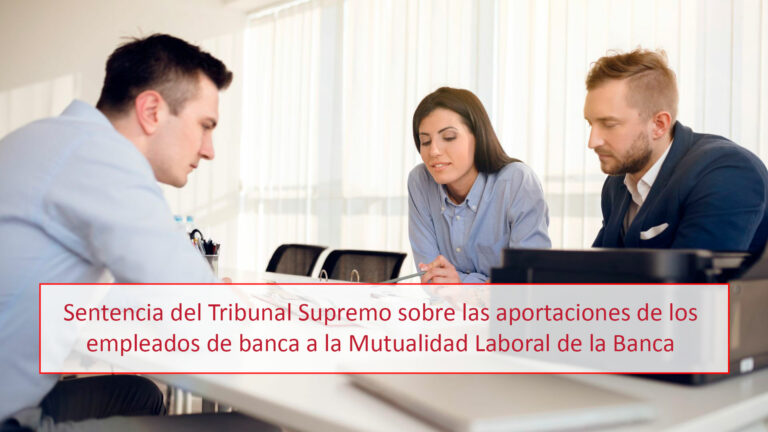
The Supreme Court, in a recent ruling (STS 707/2023, of February 28) ruled on whether the contributions made to the Banking Labor Mutuality (hereinafter, MLB) in the period between January the 1st 1967 and December the 31st, 1978, the Second Transitional Provision (hereinafter, DT2ª) of Law 35/2006, of November the 28th, on the Personal Income Tax (hereinafter, LIRPF) may apply:
Second transitional provision. Transitional regime applicable to mutual benefict societies.
Retirement and disability benefits derived from insurance contracts concluded with social security mutual societies whose contributions, made prior to January 1, 1999, have been subject to a reduction at least in part in the tax base, must be included in the taxable base of the tax on income from work.
The integration will be made to the extent that the amount received exceeds the contributions made to the mutual society that have not been subject to reduction or reduction in the tax base of the tax in accordance with the legislation in force at any time and, therefore Therefore, they have previously paid taxes.
If the amount of the contributions that have not been subject to reduction or reduction in the tax base cannot be proven, 75 percent of the retirement or disability benefits received will be included.
The pensioners who contributed amounts to the MLB in the period between 1967 and 1978 have had to pay taxes on them, and no amount could be deducted from personal income tax in those years for the contributions they made. However, as the taxpayer now receives his retirement pension, he considers them as income from work to which the DT2ª of the LIRPF cannot be applied.
The DT2ª provides that the contributions that could not be subject to reduction in the taxable base of the tax be integrated at 75 percent, thus avoiding being taxed twice for the same concept, since the opposite leads to the violation of the principle of economic capacity of article 31.1 of the Spanish Constitution.
Contributions to the MLB could not be deducted from the taxpayer’s personal income tax base, as we have already stated throughout this article in the indicated period, neither as contributions to Social Security, nor as contributions to mutual benefit societies, which is why which the aforementioned DT2ª is introduced.
The argument used by the Tax Agency to not allow the application of the DT2ª of the LIRPF is that such contributions have the nature of Social Security contributions, despite the fact that the taxpayer was never able to deduct them from their personal income tax base in accordance with the current legislation of said tax at all times.
The Court, in the aforementioned ruling, rules that, regardless of the fact that the MLB became the Social Security Management Entity from January the 1st, 1967 until its definitive integration into it on January the 1st, 1979, such contributions were made to the MLB and not to Social Security, which implies that the taxpayer can apply DT2ª.
The original conditions of the city of Malaga and its coast (climate, geographical location, gastronomy,…
The rules for distributing dividends in capital companies are set out in Royal Legislative Decree…
The presence of a notary public and the public faith that he or she imparts…
Individuals who acquire their tax residence in Spain as a result of moving to Spanish…
We obtain a favourable ruling in an eviction trial condemning the tenant to vacate the…
Many property purchasers when buying high value properties wonder whether it would be a good…